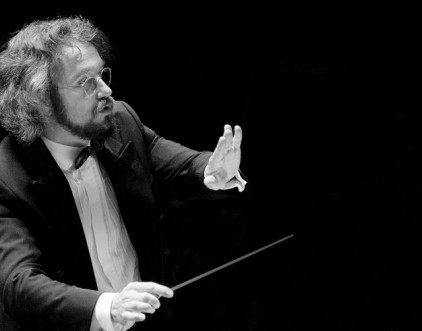Mahler’s farewell given gleaming advocacy by Kalmar and the Grant Park Orchestra

Traditionally, Beethoven’s Ninth Symphony has served as the Big Bertha of the symphonic repertoire, a work reserved for special occasions and a vehicle for a conductor and orchestra to demonstrate their corporate virtuosity and interpretive depth.
In the last decade, Mahler’s Symphony No. 9 has provided a bit of competition as the ultimate musical blood-workup—an epic, complex, hugely demanding work that—even sans vocal soloists and chorus—presents a test of a conductor and orchestra’s mettle.
Ravinia and the Grant Park Music Festival are both presenting the ninth symphonies of Beethoven and Mahler this summer, and next weekend Chicago’s lakefront festival will wrap its 75th season with Beethoven’s bear-hug embrace of humanity. On Friday night, however, Carlos Kalmar and the Grant Park Orchestra took their turn at Mahler’s death-haunted Ninth at the Harris Theater.
With its scale, extraordinary demands and interpretive pitfalls, Mahler’s Ninth is a kind of physical and intellectual triathalon for musicians. It requires a first-rate orchestra, a conductor who knows where he wants to go with this Leviathan, and the podium skills to convince his players to follow him on the journey.
It is a testament to the achievement of Kalmar in Chicago and the partnership he has built and honed over the last decade with Grant Park’s superb musicians that they could not only perform Mahler’s ninety-minute epic with complete technical assurance but pull it off with such impressive expressive power and eloquence.
Outwardly, Mahler’s last-completed symphony is his wiedersehen to life and his art, the handprints of his style—-the rustic Landler, ironic contrasts and heart-piercing sadness— magnified and intensified, fraught with not just personal devastation but far-reaching import and broader significance for the world at large.
Fine as they are, the Grant Park strings can’t quite match the rich sonority and burnished ballast of their CSO counterparts, and in the opening Andante, that lack of weight was evident. Still, Kalmar drew striking delicacy and transparency from the string choirs in the long first movement.
Yet while the playing was immaculate, the performance felt almost too well-groomed, missing that danger and unblinking stare into the darkest shadows of the abyss. The malign muted brass emerged more like a clever scoring detail than metaphysical danger, and while unfailingly polished, alertly balanced, and dynamically scrupulous, there was little of the music’s tormented soul.

Yet with the second movement, the performance found its footing. Here Kalmar and the players delved beneath the gleaming surface, bringing out the rude energy of the galumphing semi-satiric Landler, with Kalmar teasing out the subversive irony. In the ensuing Rondo-Burleske, the performance really hit its stride, the fury and acid cynicism built up to a daunting whirlwind of unhinged mania.
Kalmar and the orchestra rose to the supreme challenge of the closing Adagio masterfully. The conductor led an intensely expressive rendering of the thirty-minute finale, one that fully conveyed the deep rumination and philosophical sense of last things. With strikingly polished and acutely nuanced playing by the Grant Park musicians, the eventual stoic acceptance was movingly conveyed, the final faltering string phrases dying away to silence having a profound effect.
Kalmar and all the Grant Park players deserve the highest accolades for this performance, with first-class playing in all departments. Special kudos to the sterling contributions of many principals, including concertmaster Jeremy Black, violist Terri Van Valkinburgh, oboist Martin Hebert, bassoonist Eric Hall, hornist Jonathan Boen and trumpet David Gordon.
Carlos Kalmar and the Grant Park Orchestra will perform Mahler’s Symphony No. 9 at 7:30 p.m. Saturday at the Harris Theater. Admission is free. www.grantparkmusicfestival.com; 312-742-7638.
Posted in Performances





Posted Aug 09, 2009 at 1:53 am by Laura
As a member of the Grant Park Orchestra, I would like to commend this website for providing a much needed forum for the classical music world in the Chicago area. Although this review is very thoughtful, I would like to point out a few things that might provide additional useful information for the reader. First of all, the Grant Park string section is smaller in size compared to the CSO. We simply do not have the same amount of players that might provide the “rich sonority and burnished ballast” that the Chicago Symphony employs. The assertion that the playing was “immaculate and too well groomed” is actually a testimonial to the virtuosity of the ensemble as we only had three rehearsals for this massive undertaking. The Grant Park Orchestra has never performed this piece in its 75 year history. Perhaps the “unblinking stare into the darkest shadows of the abyss” will become apparent in future performances when the orchestra is more familiar with this epic symphony. In addition, our premiere performance of the piece was broadcast live on WFMT, which perhaps might explain the careful and thoughtful interpretation of the first movement. The orchestra was under an incredible amount of pressure, and one can understand a more cautious approach considering the circumstances.
While I understand the need to compare and contrast, the reader must consider that the CSO is a 52-week ensemble that performs together regularly, and the Grant Park Orchestra is a 10-week festival that draws from the best talent from many different ensembles. Personally, I am proud to be a part of a group that consistently performs at such a high level.
Thank you for attending our concerts, and please keep writing about all of the fine ensembles in the Chicago area.